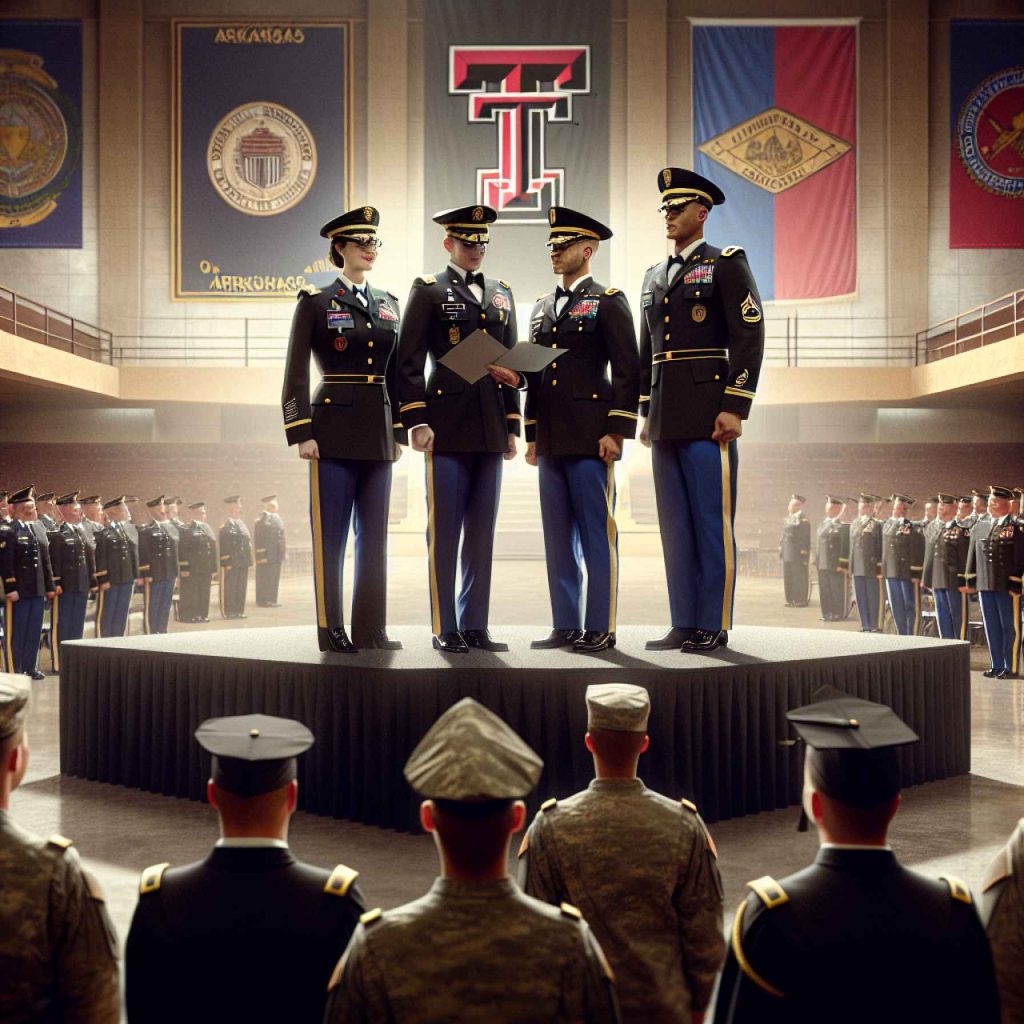
- Three Arkansas Tech University graduates were commissioned as second lieutenants in the U.S. Army and Arkansas Army National Guard.
- Kavon Niknafs, with a background in computer science, will become a field artillery officer in the Arkansas Army National Guard.
- Dale Lecita, a business graduate, set to start his career as an aviation officer in the Arkansas Army National Guard.
- Daveon Carter, who studied psychology, sociology, and criminal justice, will serve as an ordnance officer in the U.S. Army.
- The ceremony underscored the legacy of the ATU Army ROTC, which has commissioned over 800 officers since 1952.
- The event highlighted the importance of duty, integrity, and service as key values these new officers will uphold.
- Their commissioning marks the beginning of a journey to lead with honor and serve with purpose.
Bright futures unfurled on a momentous spring afternoon as three graduating seniors from Arkansas Tech University donned the insignias of second lieutenants. In a ceremony brimming with tradition and honor, Daveon Carter, Dale Lecita, and Kavon Niknafs stepped into their new roles under the discerning eyes of family, friends, and the ROTC cadre at the Doc Bryan Student Services Center.
The transition from student to officer is no small feat. These men, bound by the shared experience of the ROTC program, are now woven into a rich tapestry of history. The tech-savvy and forthright Kavon Niknafs will apply his computer science skills as a field artillery officer in the Arkansas Army National Guard. Dale Lecita, a freshly minted business graduate, takes to the skies as an aviation officer, also within the Arkansas Army National Guard. Meanwhile, Daveon Carter, whose academic journey spanned psychology, sociology, and criminal justice, will direct his leadership towards the logistics of war as an ordnance officer in the U.S. Army.
Each step across that stage marked a culmination, not just of their rigorous academic and ROTC training, but a nod to the legacy of over 800 officers that the ATU Army ROTC program has commissioned since its inception in 1952. With each gold bar pinned to their uniforms, Carter, Lecita, and Niknafs embraced a commitment far greater than themselves—upholding the diligent spirit and core values of duty, integrity, and service.
As the echoes of applause settled in the lecture hall, it was evident that this milestone was more than a ceremony; it was a powerful reminder of the responsibility imbued in these young leaders. The journey that began with worn textbooks and early morning drills is set to continue beyond the university’s borders, charting courses into uncharted territory with dedication and perseverance.
These newly commissioned officers embody a promise: to lead with honor and to serve with purpose. Arkansas Tech University stands proud of its latest cohorts, as they bear not only their gold bars but the weight of tradition and the promise of a formidable future in service.
Celebrating Tradition and Transition: New Officers Embark on Military Careers
The Unexplored Dimensions of ROTC Commissioning at Arkansas Tech University
The commissioning of ROTC cadets into officers is a historical tradition deeply embedded within military and educational institutions like Arkansas Tech University (ATU). The recent ceremony bestowed the rank of second lieutenant upon three exemplary graduates who have completed rigorous training and academic programs. Let’s delve deeper into the aspects that were not fully explored in the original article, shedding light on the impact, challenges, and opportunities that accompany such a transition.
Diverse Academic Backgrounds and Military Roles
Understanding the diverse educational backgrounds of these new officers enhances the perspective on their future roles:
– Kavon Niknafs: With a degree in computer science, Niknafs is poised to leverage his technical expertise as a field artillery officer in the Arkansas Army National Guard. This role typically involves the use of cutting-edge technology in targeting and operational strategies, reflecting the increasing importance of tech skills in military operations.
– Dale Lecita: As a business graduate, Lecita will tackle the complex logistics and operational management challenges present in aviation roles. Aviation officers are crucial for air operations, and Lecita’s understanding of business principles may enhance efficiency and innovation.
– Daveon Carter: Carter’s background in psychology, sociology, and criminal justice equips him with a unique perspective on leadership and human behavior, essential for his role as an ordnance officer responsible for managing military supplies and equipment.
The Legacy and Impact of the ATU ROTC Program
Since its inception in 1952, the Arkansas Tech University ROTC program has played a pivotal role in shaping over 800 officers. The commissioning ceremony is much more than a formal event; it signifies the ongoing legacy of the program, which consistently produces competent leaders who have a profound impact on both military and civilian communities.
Challenges and Opportunities for New Officers
– Leadership Challenges: Stepping into leadership roles comes with the challenge of adapting to real-world military environments. New officers must learn to navigate complex hierarchies and make critical decisions under pressure.
– Opportunities for Growth: The military provides avenues for continuous personal and professional development. Newly commissioned officers can pursue further education and specialized training, broadening their expertise and advancing their careers.
Market Forecasts & Industry Trends
The need for officers with technical and management skills is rising, as military operations increasingly rely on technology and efficient logistics. According to a report by the U.S. Bureau of Labor Statistics, military personnel with degrees in science, technology, business, and logistics are particularly in demand.
Insights & Predictions
Experts predict that as global military dynamics evolve, there will be a growing integration of technology in fields like field artillery and aviation. Officers like Niknafs and Lecita will be at the forefront of this transformation, potentially leading innovations that could redefine military tactics.
Actionable Recommendations for New ROTC Graduates
1. Continuous Learning: Embrace ongoing training opportunities provided by the military to enhance skills and keep abreast of new technology developments.
2. Networking: Engage with other officers and mentors to build a supportive professional network, essential for career advancement and innovation.
3. Cultural Competence: Build cultural awareness and sensitivity to strengthen leadership in diverse operational environments.
4. Health and Resilience: Prioritize mental and physical health to maintain the resilience necessary for high-stakes decision-making roles.
Suggested Related Links
For more insights on military careers and education programs, visit the U.S. Army’s official website or the Arkansas Tech University website.
These newly minted second lieutenants stand on the shoulders of a proud tradition and face forward to a future ripe with challenges and opportunities. With their academic and ROTC achievements, they are well-prepared to serve and innovate, driving the next generation of military excellence forward.



